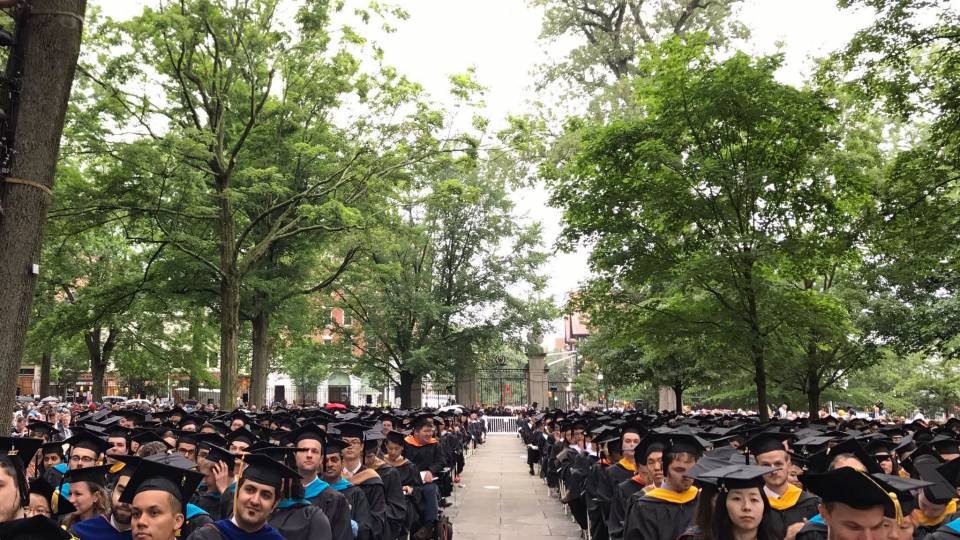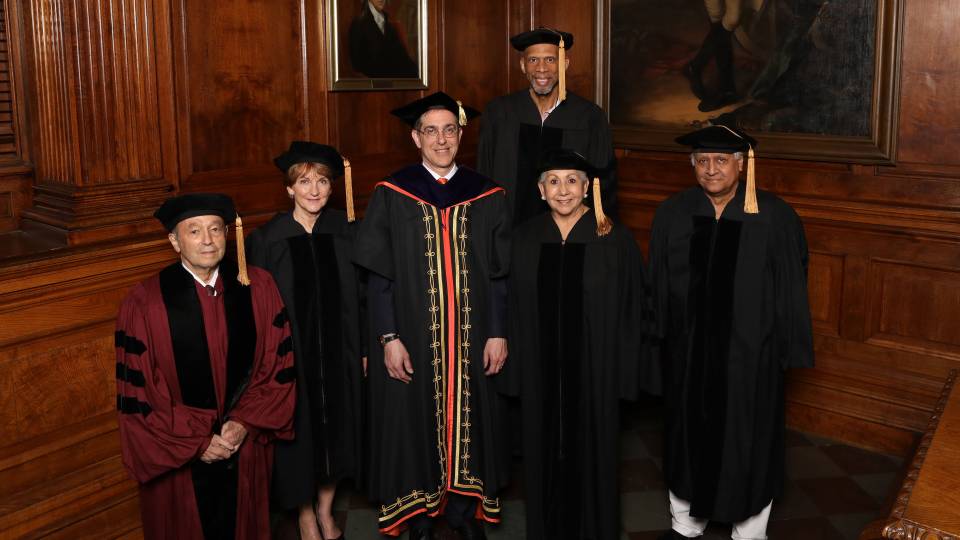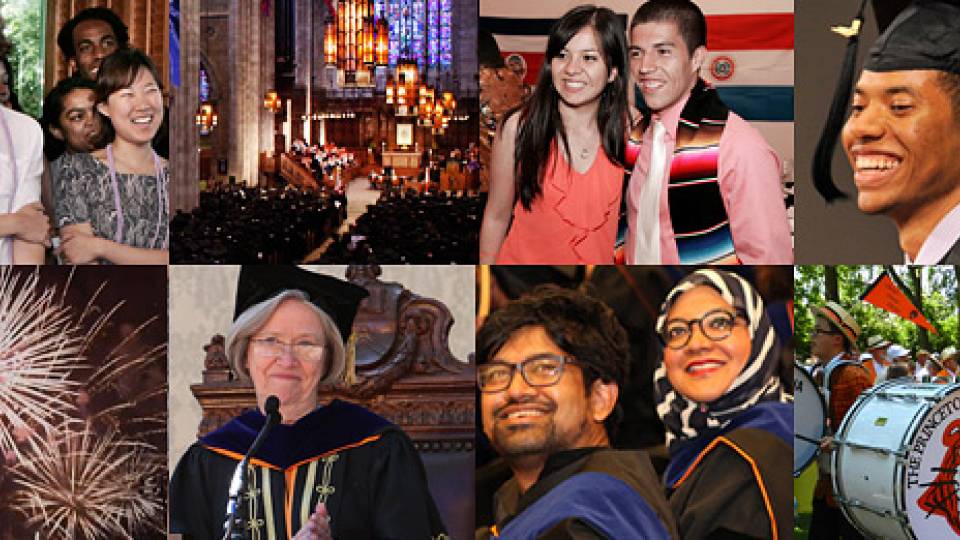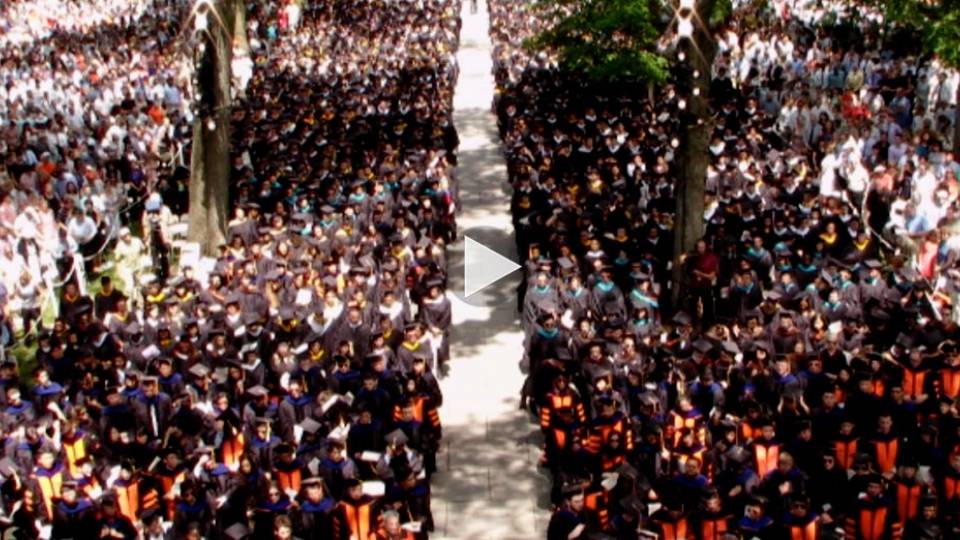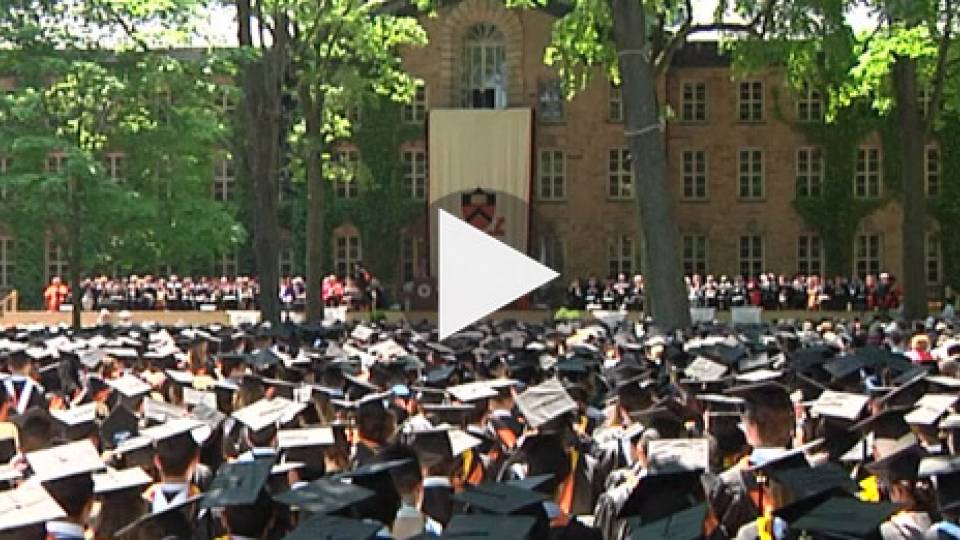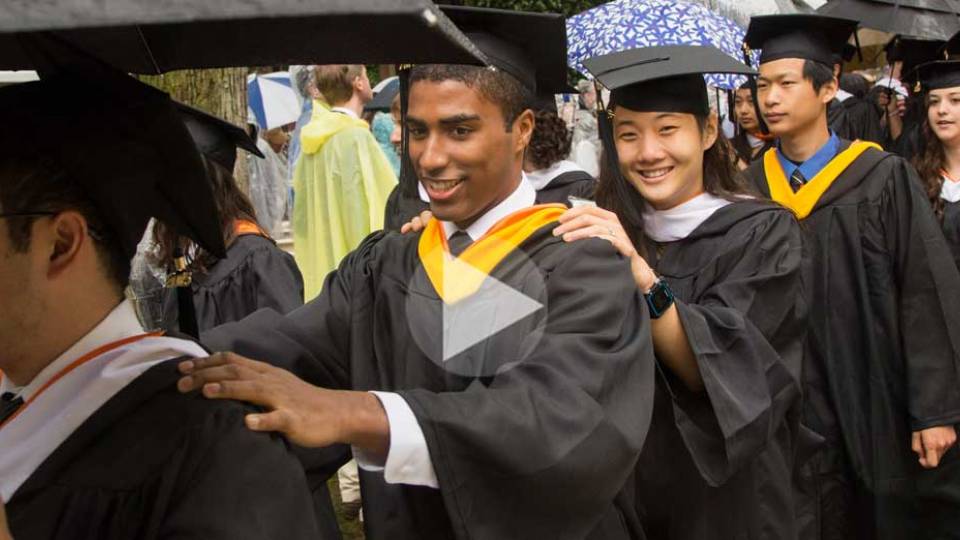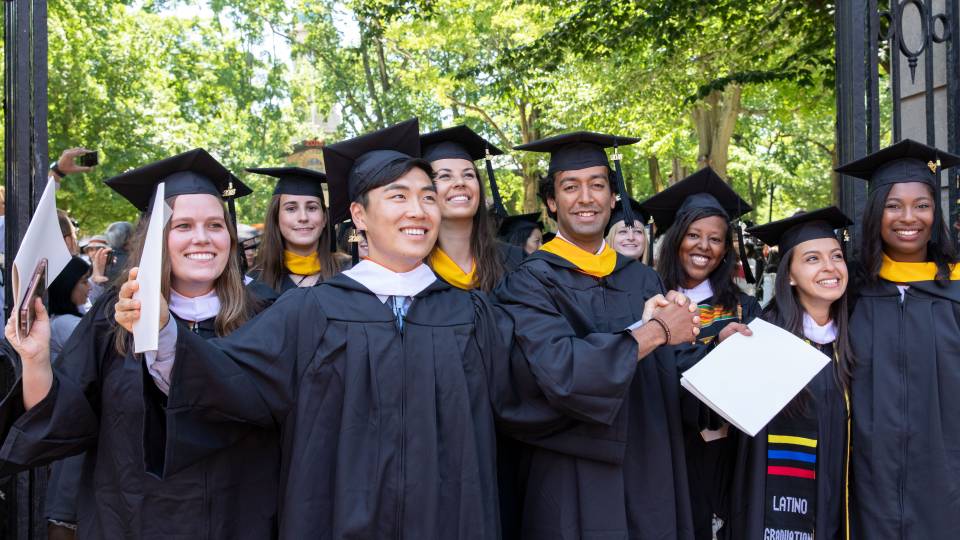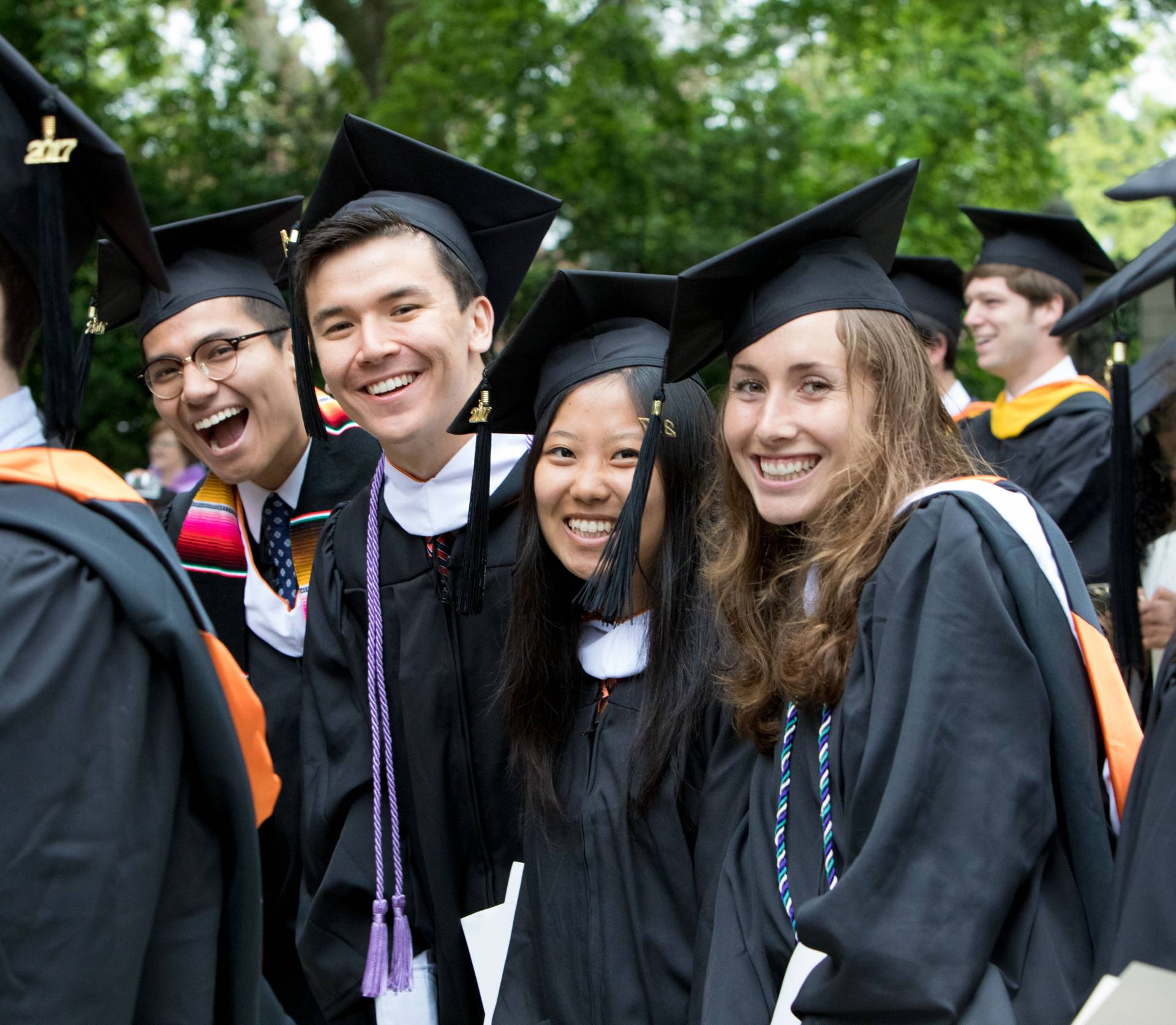
Students gather for Princeton's 270th Commencement on Tuesday, June 6. The University awarded degrees to 1,268 undergraduates in the Class of 2017, three from former classes and 520 graduate students.
At the University's 270th Commencement on Tuesday, June 6, President Christopher L. Eisgruber gave a tribute to former Princeton President William G. Bowen and urged graduates to learn from Bowen's trust in institutions to address the needs of society.
In his address to some 10,000 students and guests on the front lawn of Nassau Hall on a cool morning, Eisgruber said that he had been re-reading Bowen's speeches — including the Commencement address Bowen had given when Eisgruber graduated in 1983, which he confessed that he did not recall from that day.
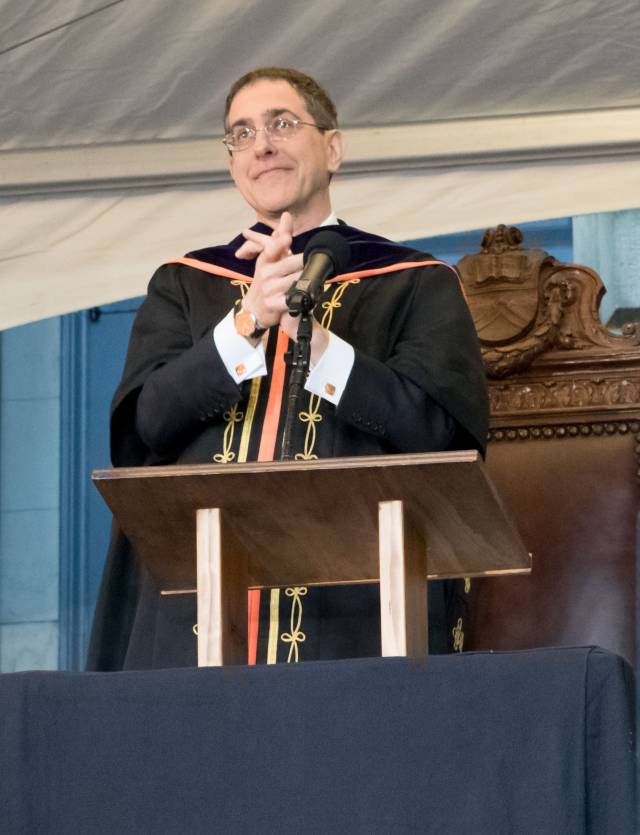
President Christopher L. Eisgruber, the 20th president of Princeton, presides over the Commencement exercises. In his address, he paid tribute to the 17th president of the University, William G. Bowen, who died in October.
Said Eisgruber: "I do remember well, however, the man who delivered it: Princeton's 17th president, William G. Bowen, of the graduate class of 1958. Bill Bowen passed away last October at the age of 83. He was a giant on this campus and a giant in higher education. His theme on the day that I graduated evoked the informal motto that is carved into this front campus. 'You will find,' he said, 'countless ways to give new life to … one of Princeton's most important traditions: a tradition of service.'"
Bowen led the University from 1972 to 1988 and was a leader in higher education for more than half a century. "Over the course of a ceaselessly productive life, Bill was a powerful and effective advocate for co-education, the excellence of the faculty, racial and socioeconomic inclusivity, and the freedom of speech," Eisgruber said. "He improved this University tremendously, and his scholarly work aided the cause of equal opportunity throughout the country."
Eisgruber relayed a story told by Dr. Harold Fernandez, Class of 1989, at this year's "¡Adelante Tigres!" conference celebrating Princeton's Latino alumni.
Eisgruber described how Fernandez, now a heart surgeon, had come to Princeton as an undocumented student. Bowen and faculty and staff members learned of Fernandez's circumstances in his freshman year. They mobilized to help address his immigration status and provided him a University scholarship to replace federal financial aid.
"Empathy, observed Dr. Fernandez, is something much needed, and all too lacking, in today's public discourse about immigration and many other topics," Eisgruber said.
Eisgruber said he agreed with Fernandez about the need for empathy, and was confident Bowen would have as well.
"Overcoming the fractious politics and bitter disagreements of our day will require empathy; it will require friendship and love; it will require an ability to connect and collaborate together," Eisgruber said. "It will also demand that we find a way to restore and rebuild faith in the institutions, of government and of society, that allow us to take on projects together."
Eisgruber said that Bowen "understood the importance of institutions in our lives," such as his "great love for this institution where he spent so much of his life."
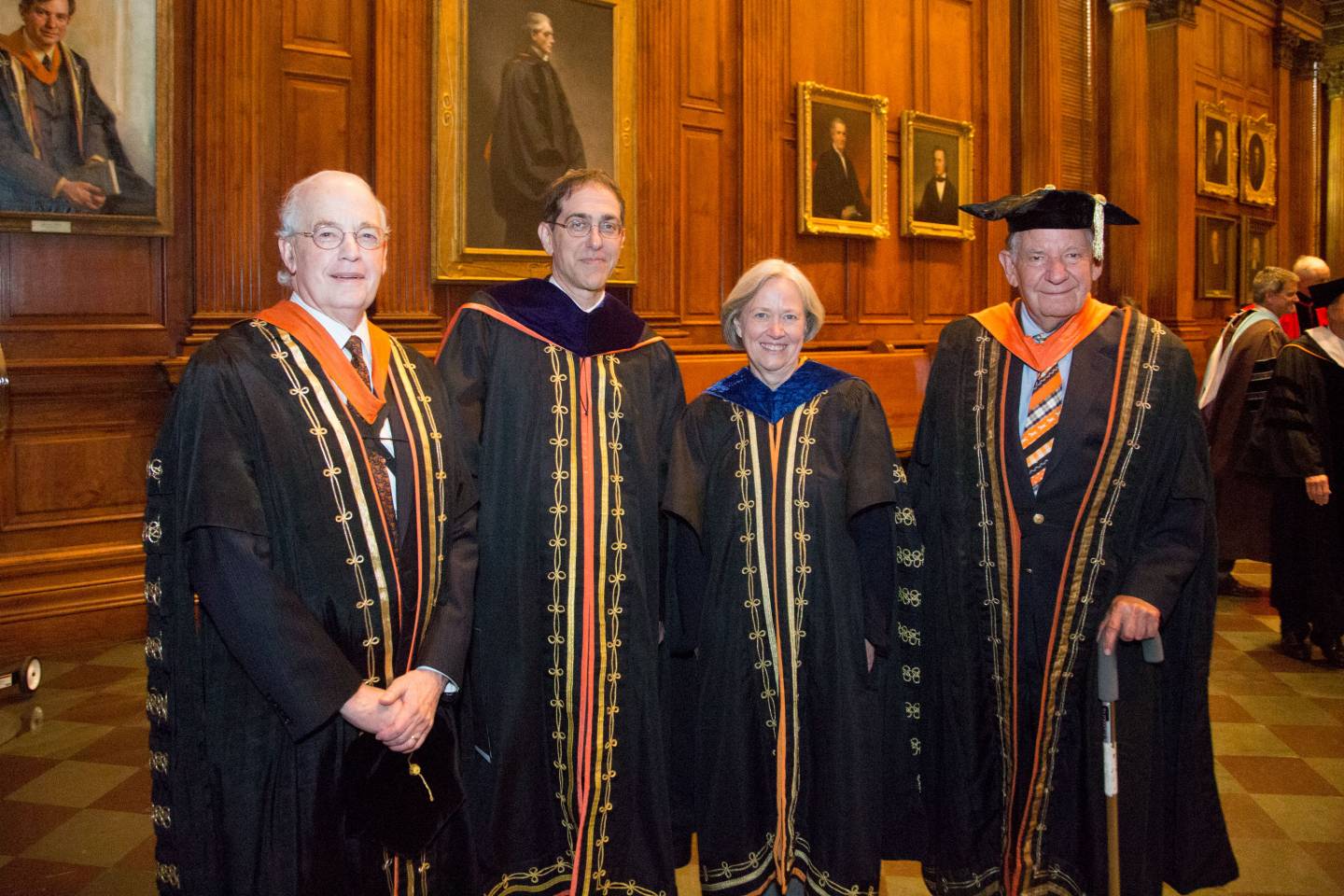
Four Princeton presidents line up in the historic Faculty Room of Nassau Hall on Sept. 22, 2013, when Eisgruber was installed as president: (from left) Harold T. Shapiro, Eisgruber, Shirley M. Tilghman and William G. Bowen.
He quoted from Bowen's 1986 Commencement address: "Institutions … exist to allow us to band together in support of larger purposes; they permit a continuity otherwise impossible to achieve; and they allow a magnification of individual efforts."
Adding his own emphasis, Eisgruber said, "I hope that you have the courage to believe in our institutions; to maintain, repair and improve them; and to sustain them for the future.
"It is all too tempting to complain about our institutions' failures — whether on environmental protection, health care, education or international affairs. It is harder to see their essential role in securing the freedoms and opportunities that we cherish. But, as Bill rightly said, we need our institutions because they enable us to pursue larger purposes together. They are not perfect, they are not even close to perfect, but they are the best means we have to address shared problems and pursue shared aspirations."
Eisgruber told the graduates that Bowen's favorite exhortation was "Onward!" It was what Bowen would "utter in the wake of successes and setbacks alike."
"That was Bill's way: to recognize challenges clearly and respond constructively," Eisgruber said. "As you move onward from this place, I wish you above all a measure of Bill's indefatigable optimism, of the conviction that we can and must work together to improve the world, and that learning, teaching and the pursuit of knowledge are an essential part of what it takes to do good."
In closing, Eisgruber quoted the parting thoughts Bowen gave at the 1980 Commencement.
"The place of learning, he said, 'should be ... a large and lasting one, consistent in character and scale with the values of this University from which you are now to take your leave. May it be a place able to accommodate the fun of learning as well as the effort all true learning requires. May its boundaries be set not by what we think we know now, but by a lifelong curiosity and an abiding appreciation for ideas — for their elusiveness, to be sure, but also for their power, their beauty, and their capacity to enrich our lives and the lives of others.'"
As the graduates prepared to greet the future beyond FitzRandolph Gate, Eisgruber said: "… congratulations to the Great Class of 2017! Onward!"
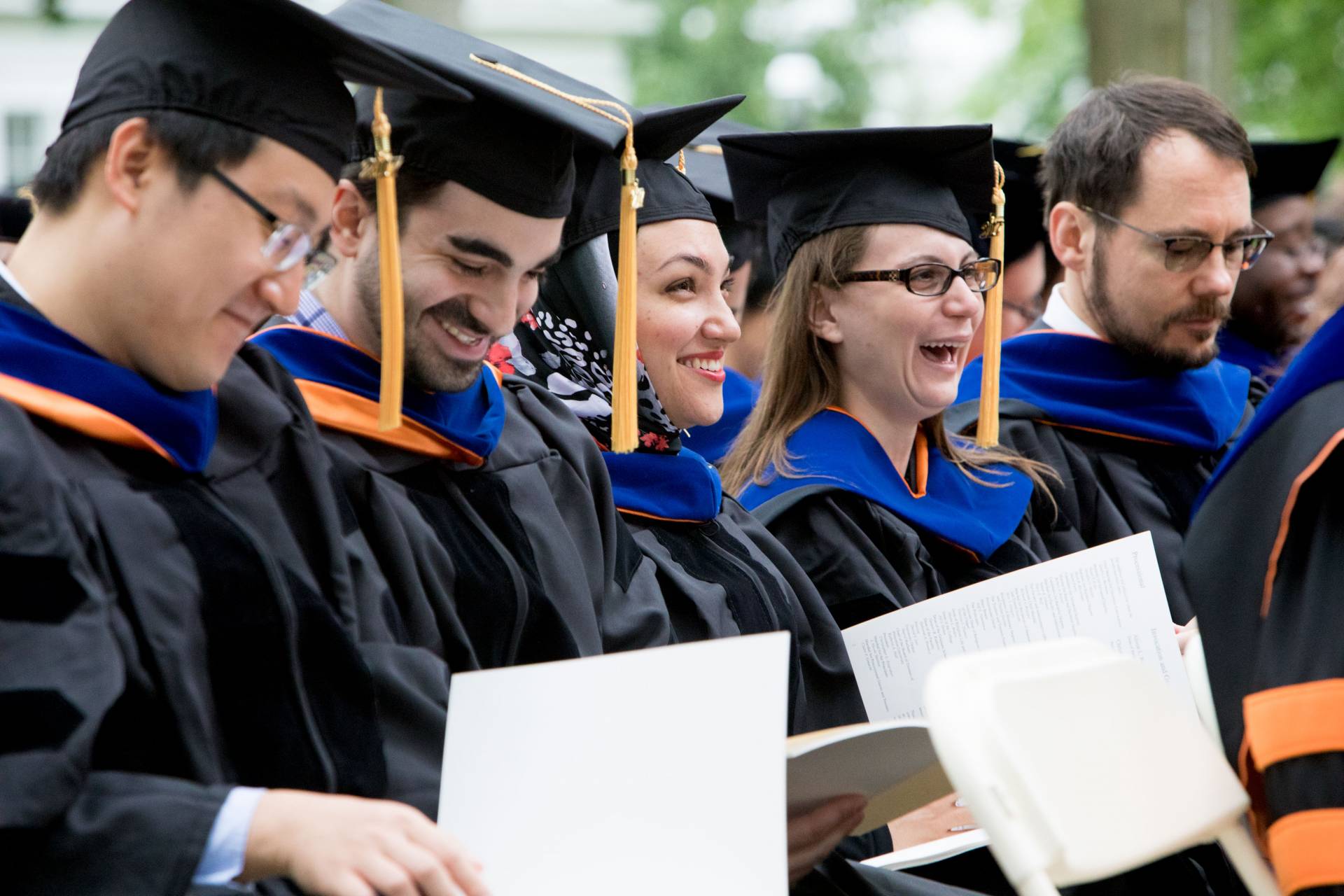
Advanced-degree recipients celebrate the day, capping off years of hard work and academic commitment.
Milestones and memories
The ceremony's two other speakers were valedictorian Jin Yun Chow, a comparative literature major from Hong Kong, and salutatorian Grant Storey, a computer science major from Berkeley, California.
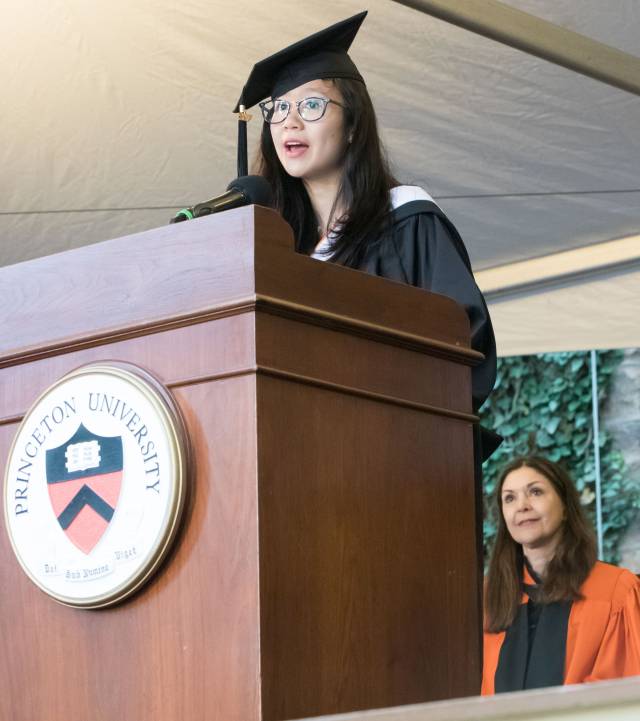
Jin Yun Chow, a comparative literature major from Hong Kong, gives the valedictory oration, asking fellow graduates to thank all of the "unsung heroes" who helped make each student's experience at Princeton special.
Addressing her fellow members of the Class of 2017, Chow said that while they "deserved to be celebrated" for all they had accomplished, she asked that they take the time to think about the "unsung heroes" who have made each student's experience at Princeton special.
Chow told a story about conversing with Margaret Campbell, a food service worker in a campus café, about what she was reading. She learned that Campbell was progressing through Nietzsche's most important works and that she was more than 250 pages into writing her own novel.
"I walked away that afternoon with a tingling feeling in my stomach," Chow recalled. "I marveled at how easy it would have been to have walked away after getting my coffee, not stopping to chat and never learning about her amazing literary endeavors. I wondered how many interesting people I didn't get to befriend over my four years here because I never gave them a chance to talk and never gave myself a chance to listen."
Said Chow: "Here's to all of our heroes, known and unknown, sung and unsung, who got us through these four years. To them, and to everyone who has been there for us through this journey, thank you."
Storey delivered the salutatory address in Latin. This Princeton tradition dates to the first Commencement in 1748, when the entire ceremony was conducted in Latin. The Latin Salutatory, Princeton's oldest student honor, began as a formal address but today often contains humorous tributes and a fond farewell to Princeton.
In his address [English translation], Storey called on the muse to "sing" of the "brilliant students" who did battle on the academic fields, to "sing" of the leadership of President Eisgruber and "our wise professors," and not to forget to praise the love and support of "our dearest families and guardians."
Said Storey: "Lastly, muse, sing of friends and friendship. Through the dark days and the light ones, whether we were laughing at funny pictures of cats or crying over difficulties of love, our friends were by our sides and helped us grow."
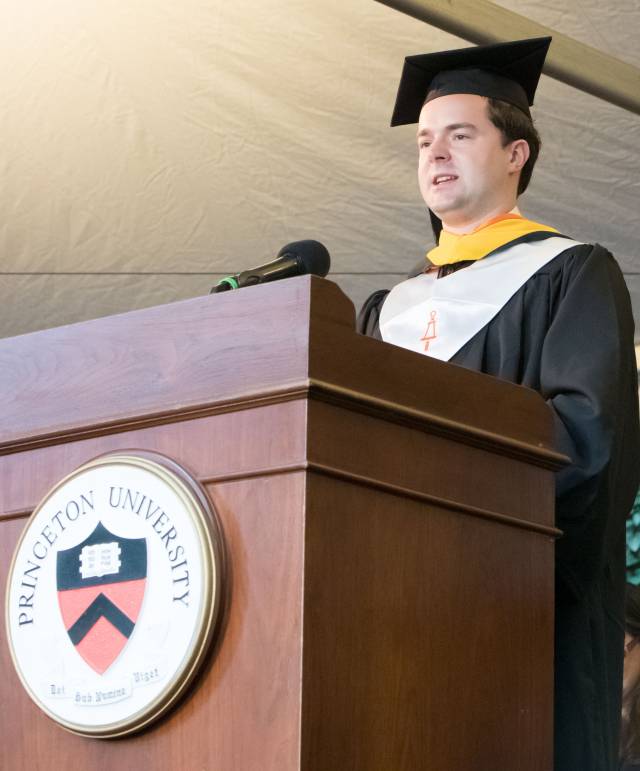
Grant Storey, a computer science major from Berkeley, California, delivers the salutatory address in Latin — a tradition dating to 1748 and Princeton's oldest student honor.
The University awarded degrees to 1,268 undergraduates in the Class of 2017, three from former classes and 520 graduate students. It also conferred honorary degrees upon five people for their contributions to athletics, education, the humanities, public service and the sciences:
- Kareem Abdul-Jabbar, basketball star, writer and social activist;
- Juliet Villarreal García, a pioneer in higher education and a senior adviser in the University of Texas System;
- Pamela Matson, dean of the School of Earth, Energy and Environmental Sciences at Stanford University;
- Jeremiah Ostriker, the Charles A. Young Professor of Astronomy on the Class of 1897 Foundation, Emeritus, at Princeton; and
- Bunker Roy, a social activist and educator who founded the Barefoot College in India.
Princeton also honored excellence in teaching at the Commencement ceremony. Four Princeton faculty members received President's Awards for Distinguished Teaching and four outstanding secondary school teachers from across New Jersey were recognized for their work.
On June 5, seniors were recognized at Class Day ceremonies on Cannon Green. The keynote speaker was film director Baz Luhrmann.
Luhrmann said: "Life is a blank page and anything is possible. ... [that] is your mission: self-revelation, to reveal who you really are. "It's kind of like your superpower and that, above and beyond everything else, is probably the best thing I can hand to you about life. Going through life, you need to reveal to yourself who you really are. What is the movie of your life? What is your character? What is your script? How will you play out the play of your life?"
In the afternoon, advanced-degree recipients participated in the Hooding ceremony in Jadwin Gym, where Dean of the Graduate School Sanjeev Kulkarni and Eisgruber congratulated the students. Nearly 80 faculty members participated in hooding the degree recipients, indicating the close mentoring relationship that often develops during graduate study.
"Their presence and participation reminds us that the complex journey to an advanced degree is made possible only with the continued encouragement, guidance and support of dedicated faculty," Kulkarni said.
Anne Holton, a 1980 Princeton alumna and former secretary of education and former first lady of Virginia, spoke at the interfaith Baccalaureate service June 4 in the University Chapel. Holton is a visiting professor at the Schar School of Policy and Government and College of Education and Human Development at George Mason University.
Holton said she was "humbled and grateful" to share the moment with the graduating students, and emphasized the importance of failure in reinforcing the values of humility and hope. She said that hope is "to believe, sometimes against all evidence … that things do ultimately work out for the good. Not necessarily in ways we understand, or on our human timetable, or even in ways of earthly accounting. But fundamentally as Martin Luther King said … that the arc of history bends toward justice, and I will add, toward mercy, and indeed toward love."
Webcasts of Princeton graduation events will be available on the University's Media Central website.
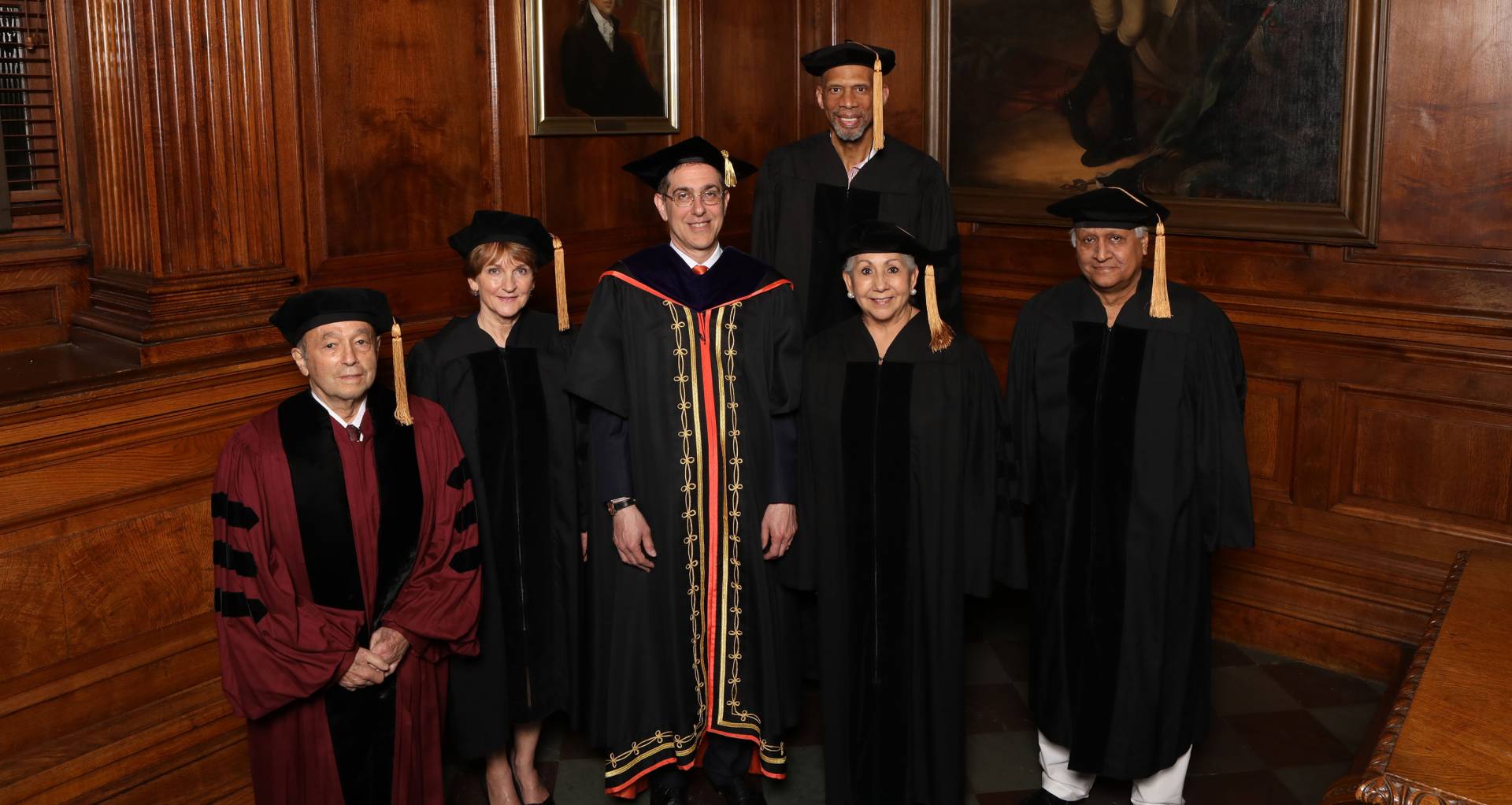
In the Faculty Room of Nassau Hall, Princeton President Christopher L. Eisgruber (third from left) gathers with honorary degree recipients (from left) Jeremiah Ostriker, Pamela Matson, Kareem Abdul-Jabbar, Juliet Villarreal García and Bunker Roy.
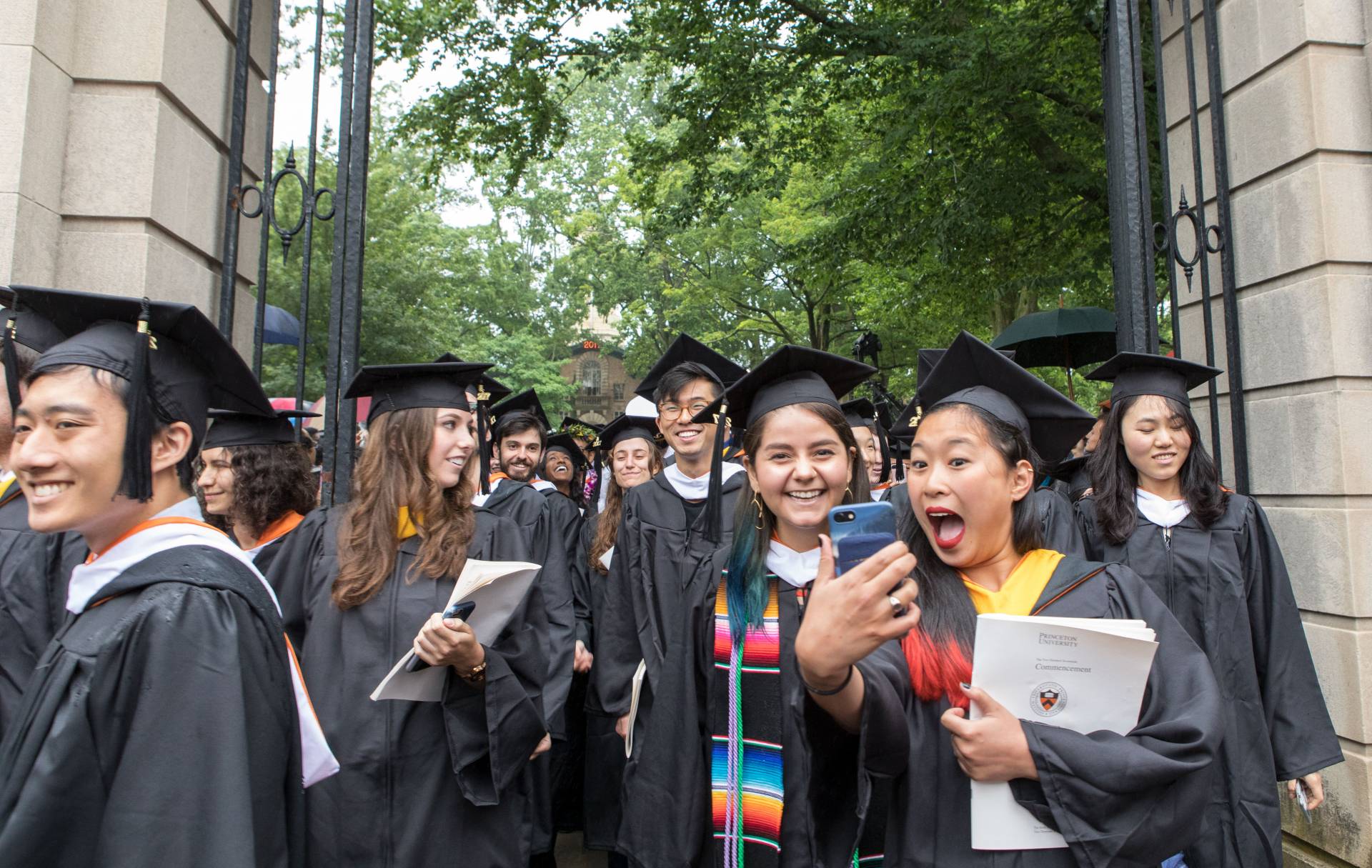
Coming through FitzRandolph Gate, these members of the Class of 2017 pass over the threshold as they transition from students to alumni.
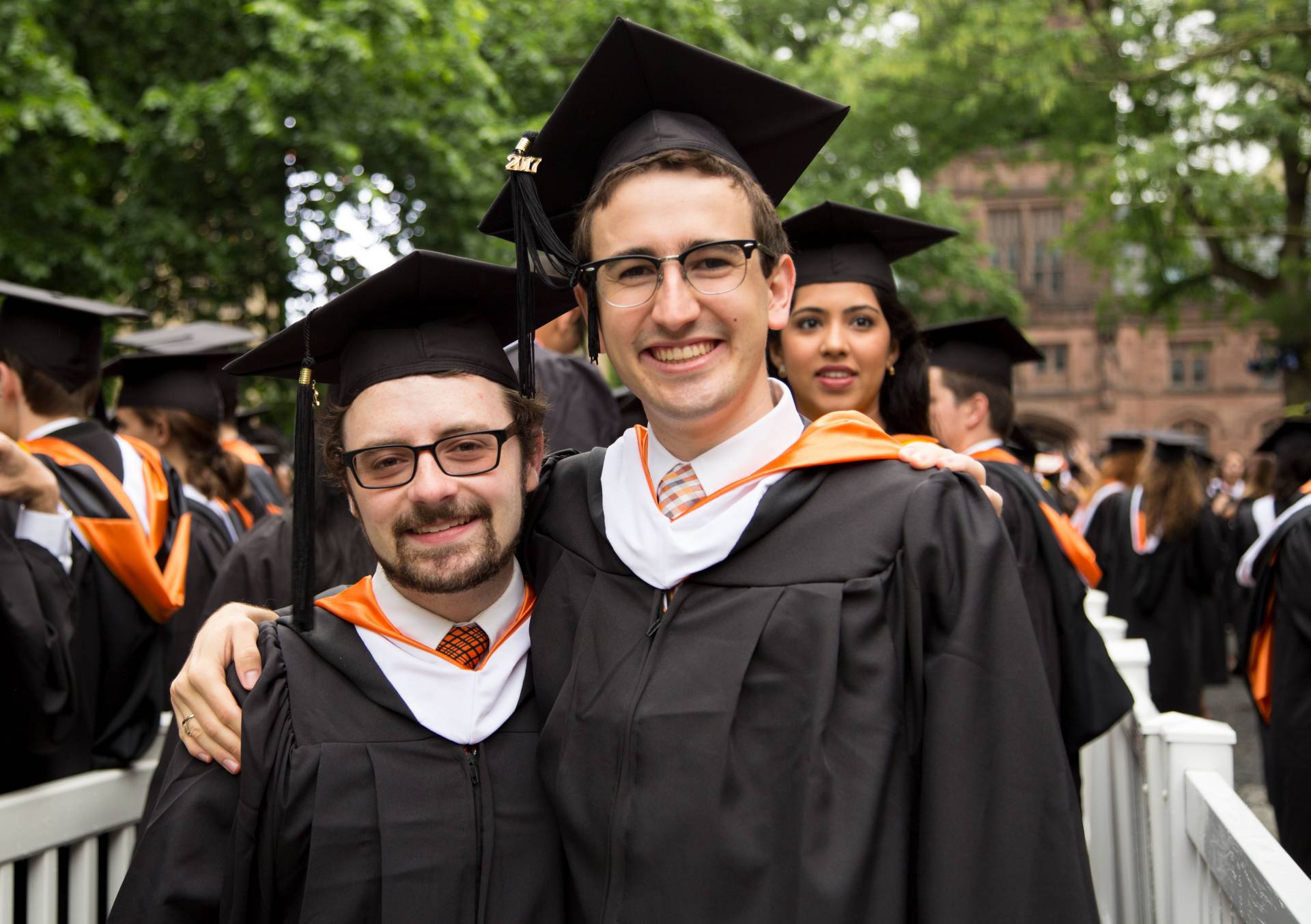
Roommates Daniel Gift, left, and Colin Lualdi prepare for the processional to the front lawn of Nassau Hall on the cool morning of Commencement.
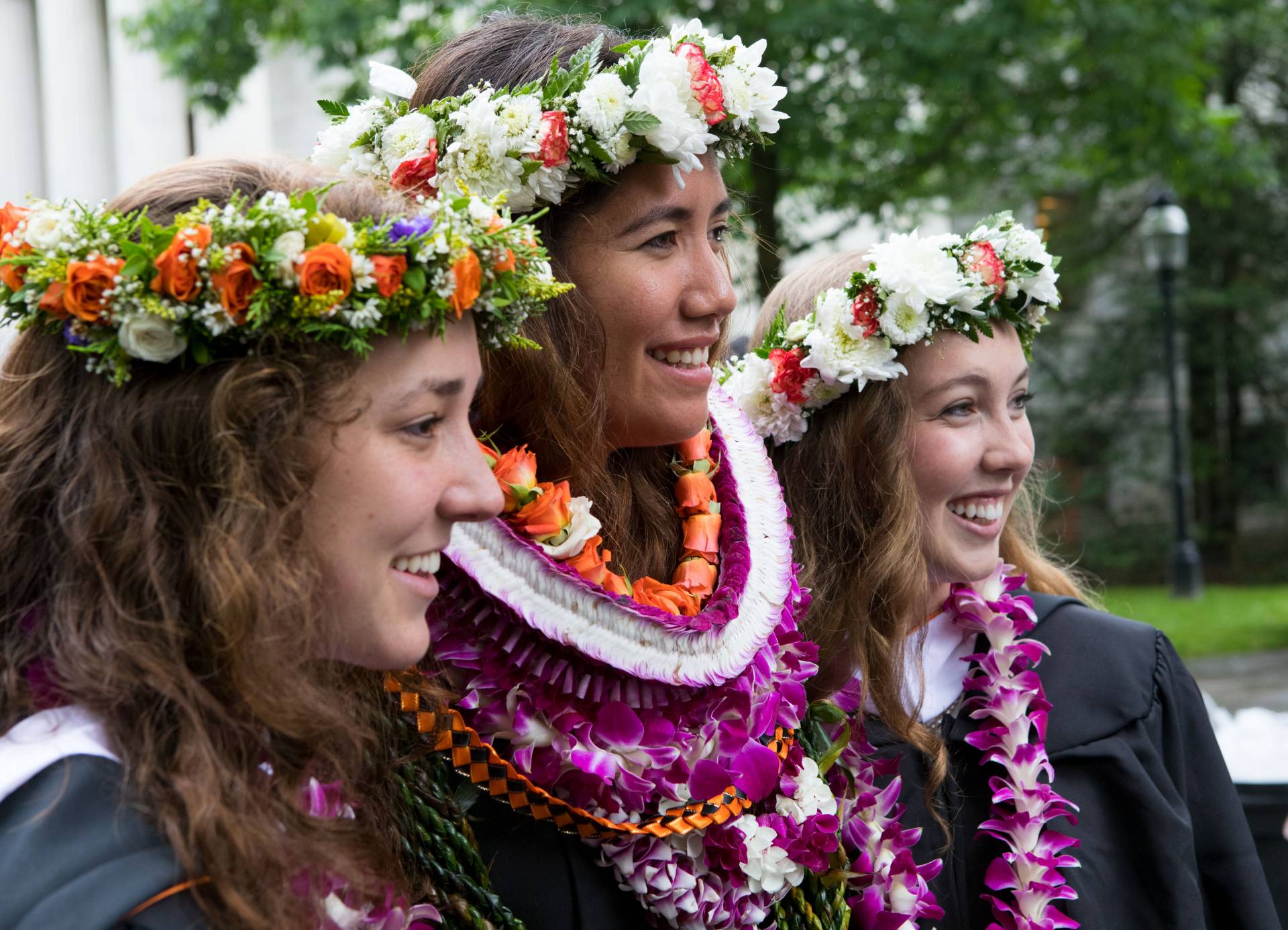
Maria del Pilar Bennett of Charleston, South Carolina (left); Jantien Kanoe Schizuru of Oahu, Hawaii; and Marina Macklin of Warrenton, Virginia, celebrate together after the Commencement ceremony.
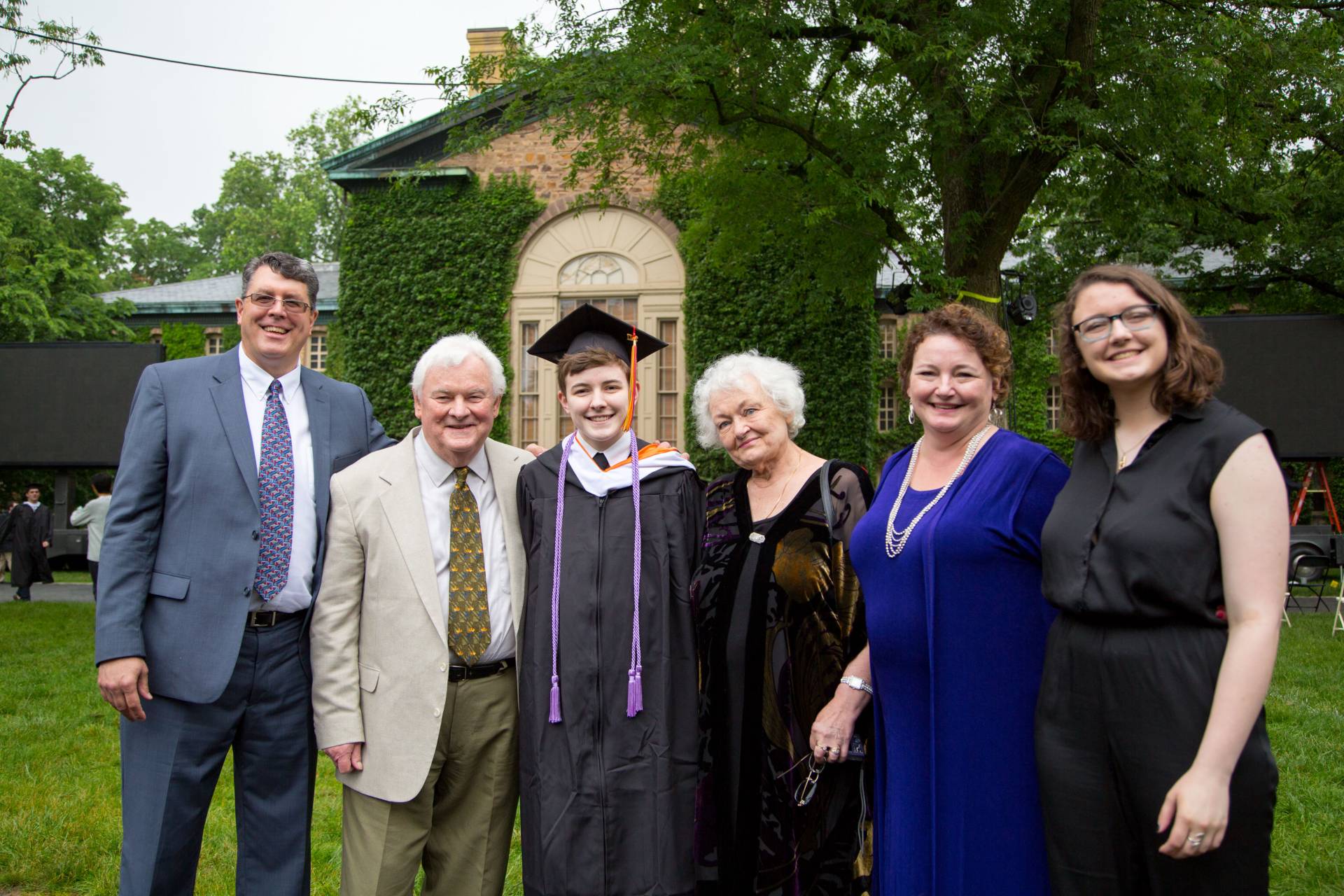
In his graduation gown, Christopher Snider, a music major, celebrates the journey from student to graduate with family members.
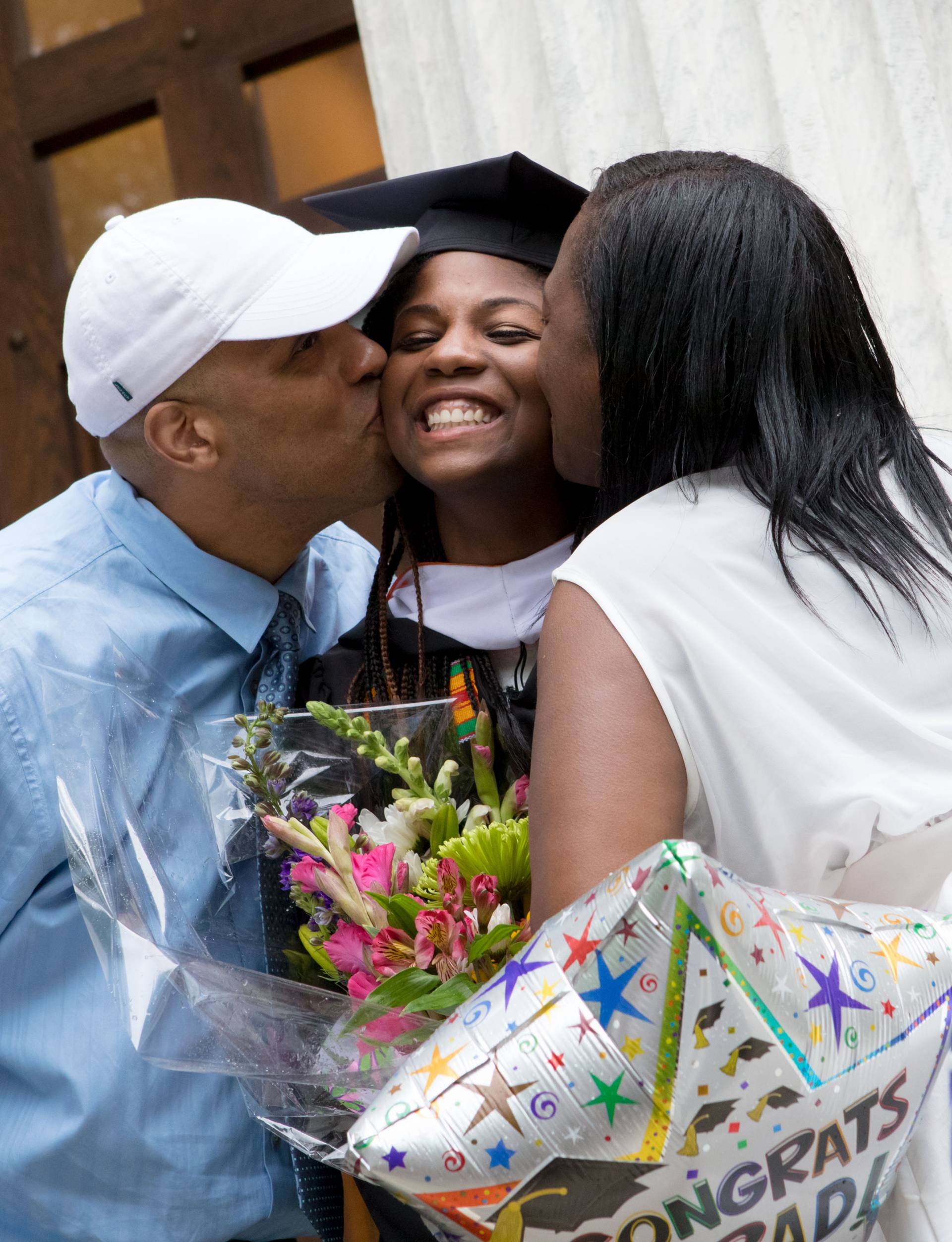
Briana Payton of Detroit, a sociology major who received a Truman Scholarship for graduate school to prepare for a career in public service, enjoys a kiss on each cheek from her father and mother.
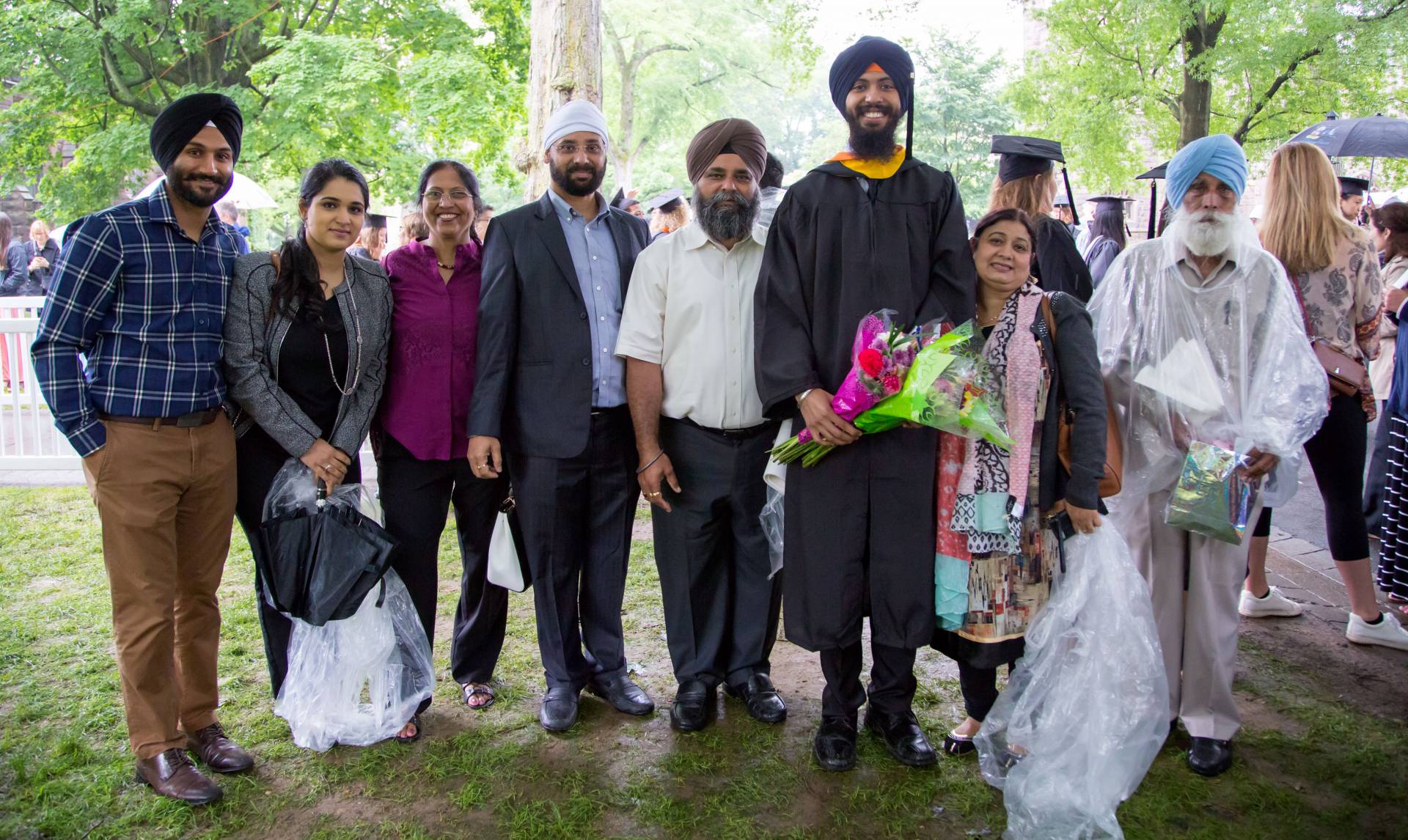
Amandeep Saini (center with flowers), who earned a B.S.E. in computer science, gathers with his family.
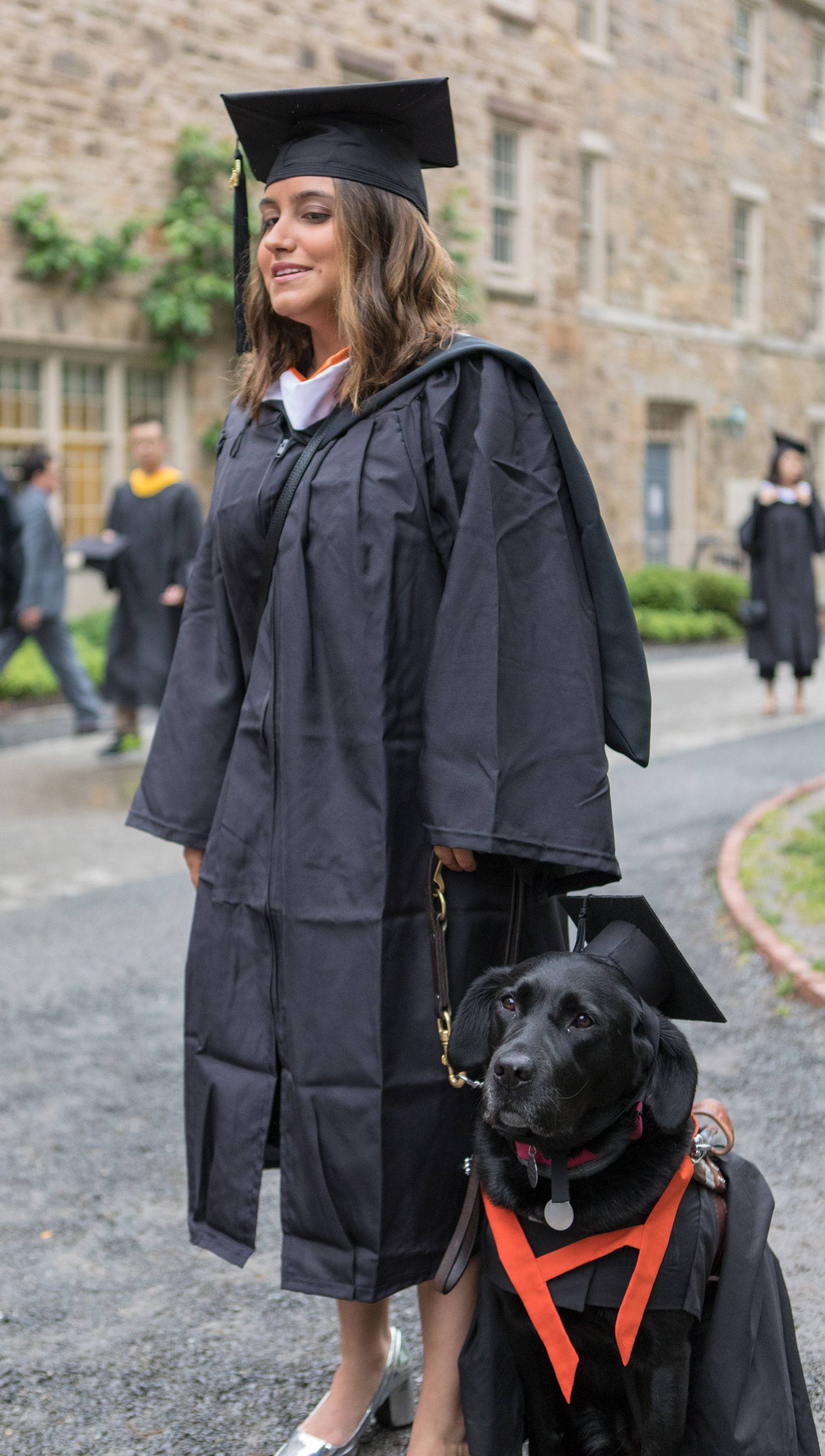
Sofia Gallo of New York City and her guide dog, Karleen, get ready for the Commencement processional.
